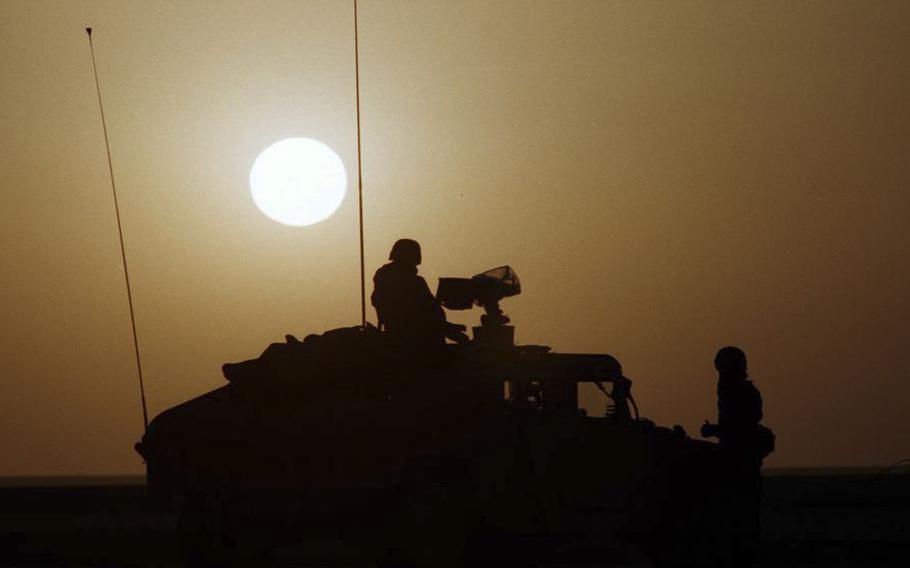
U.S. service members are silhouetted against the desert sun during the Gulf War. (Stars and Stripes)
(Tribune News Service) — While serving in the Persian Gulf War in his 20s, Anthony Hardie began having unexplained symptoms: respiratory problems, chronic fatigue and gastrointestinal issues that only worsened once he came home.
At the time, scientists and government officials weren’t sure if the symptoms were caused by stress or a more sinister disease. Thirty years later, the National Institutes of Health and Department of Veterans Affairs have launched a 5-year study to understand the chronic symptoms of what’s now called Gulf War illness.
Dr. Robert Haley, a professor of medicine and epidemiology at UT Southwestern Medical Center, has been researching Gulf War illness since a fateful meeting with Dallas philanthropist Ross Perot in the ’90s.
“From the very beginning, this was called a mystery disease,” Haley said, “because nobody could agree on what the cause was.”
Haley published a paper last year identifying sarin gas — a nerve agent that attacks the brain that was detected in Iraq during the war — as a potential cause of Gulf War illness. Haley hopes the NIH and VA’s national study will ultimately lead to treatments for Gulf War veterans, the youngest of whom are now 50.
“This is the most optimistic I’ve been in 30 years,” he said.
A mystery disease
In the ’90s, Perot invited Haley to a meeting. Since the Gulf War ended, Perot said, he had been hearing from veterans who had fallen sick. Healthy before the war began, the veterans were experiencing brain fog, memory problems, trouble breathing and more. Perot asked Haley to run a study on the veterans.
Haley wasn’t sure that the “mystery disease” was real, but he agreed, thinking he’d soon get back to his hepatitis research. But after studying nearly 250 members of a naval battalion, most of whom had serious health problems that they attributed to the war, Haley couldn’t walk away.
“I didn’t believe it, really, up to that point, but it was real,” he said.
Haley has spent the rest of his career researching the disease. He found that Gulf War veterans had similar symptoms that were significant enough to constitute an illness; that the root of the illness seemed to lie in the brain; and that the main risk factor seemingly causing the disease was exposure to environmental pesticides or low levels of nerve gas during the war. He did so with funding from donors like Perot and former Texas Sen. Kay Bailey Hutchinson.
He fought skepticism from the scientific community along the way. In 1998, three physicians on the Presidential Advisory Committee on Gulf War Veterans’ Illnesses published an editorial in the American Journal of Epidemiology in response to one of Haley’s papers. Haley’s assertion that Gulf War illness wasn’t caused by stress, they wrote, “ill-serves the veterans who so generously and gallantly served our nation in the Gulf War.”
Haley said the skepticism never bothered him. If he could prove the existence of the illness, he said, his research would be validated.
“There was a lot of skepticism [that] had formed early,” he said. “And you know, whoever gets the message out first tends to win the day, until you just completely prove it wrong.”
Last May, Haley published a paper in the journal Environmental Health Perspectives that found that veterans who recalled hearing chemical nerve gas alarms during their deployment were more likely to develop Gulf War illness. More than that, veterans who heard the alarms and had a “weak” form of a gene that meant their bodies were not as good at breaking down the nerve gas sarin were nearly nine times more likely to develop Gulf War illness. Haley’s decades of work had landed on a potential cause for the mystery disease.
A hero to veterans
Almost a year after Haley’s paper was published, the NIH and VA launched their study of Gulf War veterans. Gulf War veterans can now enroll in the study, which will investigate how Gulf War illness looks in the brain and body to lay the groundwork for future treatments.
Hardie, who served in the U.S. Army during the Gulf War, said the new study is important and encourages veterans to sign up. But results from a 5-year study won’t be published for some time, and Hardie said veterans like him have been waiting decades for relief.
“We’re talking 40 years after the war, to finally know what’s going on in the brains and bodies of Gulf War veterans,” Hardie said.
Hardie’s group Veterans for Common Sense and Vietnam Veterans of America found that the VA rejected 90% of undiagnosed disability claims from Gulf War veterans from 2002 to the beginning of 2018, making it more difficult for them to access VA health care.
Hardie credited Haley for being one of the earliest and most influential Gulf War illness researchers.
“Bob Haley was one of the researchers who believed in Gulf War veterans before the VA ever did,” Hardie said. “And Gulf War veterans will forever be grateful.”
Adithi Ramakrishnan is a science reporting fellow at The Dallas Morning News. Her fellowship is supported by the University of Texas at Dallas. The News makes all editorial decisions.
©2023 The Dallas Morning News.
Visit dallasnews.com.
Distributed by Tribune Content Agency, LLC.